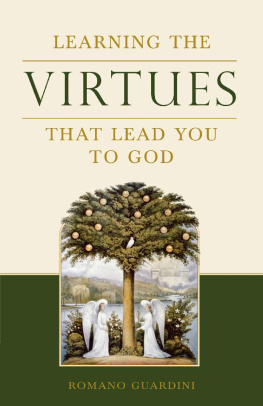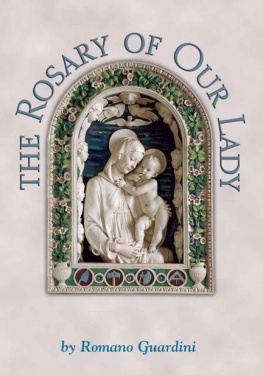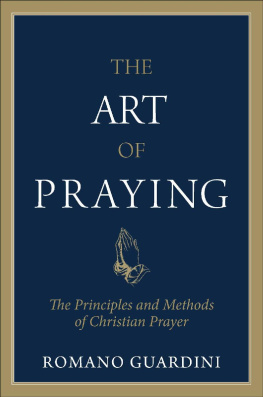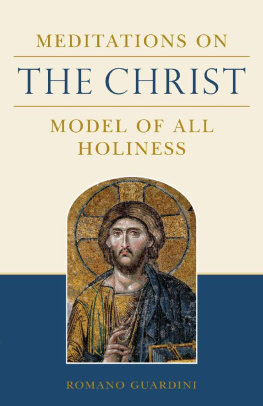Romano Guardini - Learning the Virtues: That Lead You to God
Here you can read online Romano Guardini - Learning the Virtues: That Lead You to God full text of the book (entire story) in english for free. Download pdf and epub, get meaning, cover and reviews about this ebook. year: 2013, publisher: Sophia Institute Press, genre: Science. Description of the work, (preface) as well as reviews are available. Best literature library LitArk.com created for fans of good reading and offers a wide selection of genres:
Romance novel
Science fiction
Adventure
Detective
Science
History
Home and family
Prose
Art
Politics
Computer
Non-fiction
Religion
Business
Children
Humor
Choose a favorite category and find really read worthwhile books. Enjoy immersion in the world of imagination, feel the emotions of the characters or learn something new for yourself, make an fascinating discovery.
- Book:Learning the Virtues: That Lead You to God
- Author:
- Publisher:Sophia Institute Press
- Genre:
- Year:2013
- Rating:4 / 5
- Favourites:Add to favourites
- Your mark:
- 80
- 1
- 2
- 3
- 4
- 5
Learning the Virtues: That Lead You to God: summary, description and annotation
We offer to read an annotation, description, summary or preface (depends on what the author of the book "Learning the Virtues: That Lead You to God" wrote himself). If you haven't found the necessary information about the book — write in the comments, we will try to find it.
Learning the Virtues: That Lead You to God — read online for free the complete book (whole text) full work
Below is the text of the book, divided by pages. System saving the place of the last page read, allows you to conveniently read the book "Learning the Virtues: That Lead You to God" online for free, without having to search again every time where you left off. Put a bookmark, and you can go to the page where you finished reading at any time.
Font size:
Interval:
Bookmark:


Also available from
Sophia Institute Press
by Romano Guardini:
The Art of Praying
Eternal Life
The Living God
The Lords Prayer
Preparing Yourself for Mass
The Rosary of Our Lady

Learning the Virtues That Lead You to God was originally published in 1963 by Werkbund-Verlag, Wrzburg, Germany, under the title Tugenden: Meditationen ber Gestalten Sittlichen Lebens. In 1967, Henry Regnery Company published an English translation by Stella Lange under the title The Virtues: On Forms of Moral Life. This 1998 edition by Sophia Institute Press uses the 1967 Regnery translation, with slight revisions throughout the text.
Copyright 1987 Publishing Partnership of Matthias-Grnewald, Mainz/Ferdinand Schningh, Paderborn; fourth edition, 1992. All of the rights of the Author are vested in the Catholic Academy in Bavaria.
English translation Copyright 1967 Regnery Publishing. All rights reserved. Reprinted by special permission of Regnery Publishing, Inc., Washington, DC.
Printed in the United States of America
Jacket design by Joan Barger
The cover painting is a detail of a Russian icon of
St. George, Novgorod School, 14th Century.
No part of this book may be reproduced, stored in a retrieval system, or transmitted in any form, or by any means, electronic, mechanical, photocopying, or otherwise, without the prior written permission of the publisher, except by a reviewer, who may quote brief passages in a review.
Sophia Institute Press
Box 5284, Manchester, NH 03108
1-800-888-9344
Nihil Obstat: Rev. Thomas F. Sullivan, Censor Librorum
Imprimatur: Rev. Msgr. Francis W. Byrne, Vicar General,
Archdiocese of Chicago
July 11, 1967
Library of Congress Cataloging-in-Publication Data
Guardini, Romano, 1885-1968.
[Tugenden]
Learning the virtues that lead you to God / Romano Guardini.
p. cm.
Previously published under title: The virtues.
Includes bibliographical references.
ISBN 0-918477-64-6 (pbk. : alk. paper)
1. Virtues. 2. Christian ethicsCatholic authors. I. Guardini, Romano, 1885-1968. Virtues. II. Title.
| BV4630.G813 1998 | |
| 241.4dc21 | 97-48647 CIP |
Contents
In Platos Republic, there is a passage in which Socrates demonstrates how the supreme truth is united in the Good with the divine itself. In reply, his young interlocutor, Glaucon, cries out in amazement, You speak of an inconceivably transcendent beauty!
In regard to the manner in which the great master of philosophic thought makes the state the protector of the moral order, one may well differ with him. We have learned by bitter experience what happens when government officials take into their hands what belongs to personal freedom. There is one thing, however, that Platos philosophy has made clear once and for all; that is, after the confusion and chaos introduced into thought by the Sophists, he showed that absolute values exist, that these can be known, and that therefore there is such a thing as truth. He likewise showed that these values are summed up in the majesty of that which we call the Good, and that this good can be realized in the life of man according to the potentialities of each individual. Plato showed that the good is identical with the divine; but that its realization leads man to true humanity, as virtue comes into being, and this virtue signifies perfection of life, freedom, and beauty. All this is everlastingly valid, even for us today.
These are the matters of which we intend to speak in this work. The ensuing reflectionsthey are purposely called by this name to distinguish them from scholarly treatiseshave grown out of the spoken word, and the reception given these talks has shown that our age, in spite of all its skepticism, longs for an interpretation of everyday life based upon the eternal.
This interpretation shall be carried out in a very unsystematic way. The first chapter deals with the determining points of view. Our interpretation does not pretend to be exhaustive. Rather, it lays hold upon ordinary reality as it came to our attention and seeks therein the starting points of moral self-realization. At all points, it appeals to the personal experience of the reader and strives from there to progress to a unity of ethical consciousness.
Moral teaching has become too negative; these reflections seek to do justice to the living majesty, nobility, and beauty of the good. We tend too much to view the ethical norm as external to rebellious man; here we shall regard the good as that whose realization makes man truly human. The young Glaucon was seized by a reverent transport at the words of his master. This book would attain its purpose if the reader felt that the knowledge of the good is a cause of joy.
In 1930, a collection of Letters on Self-Culture, which had been composed during the preceding years, was made and published in book form. These letters were addressed to young people and in many ways presupposed the atmosphere of the Youth Movement. The present reflections are addressed to the more mature and presuppose a knowledge of the bitter years which we have experienced since that time. A historical abyss separates these two attempts at a doctrine of life, and yet they belong together, as in the same man, youth and maturity belong together.
As regards the final chapter, Justice Before God, the reader would do well if, after taking note of it, he reconsidered the preceding reflections in the light of the points made in it.
Editors note: The biblical references in the following pages are based on the Douay-Rheims version of the Old and New Testaments. Where applicable, quotations have been cross-referenced with the differing names and enumeration in the Revised Standard Version, using the following symbol: (RSV =).

In these reflections, we shall deal with something that concerns us all, each in his own way, namely, virtue. The word probably affects us strangely, perhaps even unfavorably; it is likely to sound old-fashioned and preachy.
Forty years ago, the philosopher Max Scheler wrote an essay entitled Toward the Rehabilitation of Virtue. had petrified and become merely a doctrine of duties, was loosening up, and people were beginning once again to think of the good as something living, which concerns the whole man. In that situation, Scheler pointed out the changes that the word and the concept virtue had undergone in the course of history until they took on the wretchedly deficient character which still clings to them.
For the Greek, virtue, aret, was the nature of the noble-minded and culturally developed man; for the Roman, virtus signified the firmness and solidity which the noble man maintained in public and private life; the Middle Ages understood by virtue ( tugent ), the conduct of the chivalrous man. But gradually this virtue became well-behaved and useful, until it received the curious tone which causes aversion in the normal man.
If our language had another word, we would use it. But it has only this one; therefore we want to begin by agreeing that virtue denotes something living and beautiful.
Font size:
Interval:
Bookmark:
Similar books «Learning the Virtues: That Lead You to God»
Look at similar books to Learning the Virtues: That Lead You to God. We have selected literature similar in name and meaning in the hope of providing readers with more options to find new, interesting, not yet read works.
Discussion, reviews of the book Learning the Virtues: That Lead You to God and just readers' own opinions. Leave your comments, write what you think about the work, its meaning or the main characters. Specify what exactly you liked and what you didn't like, and why you think so.











